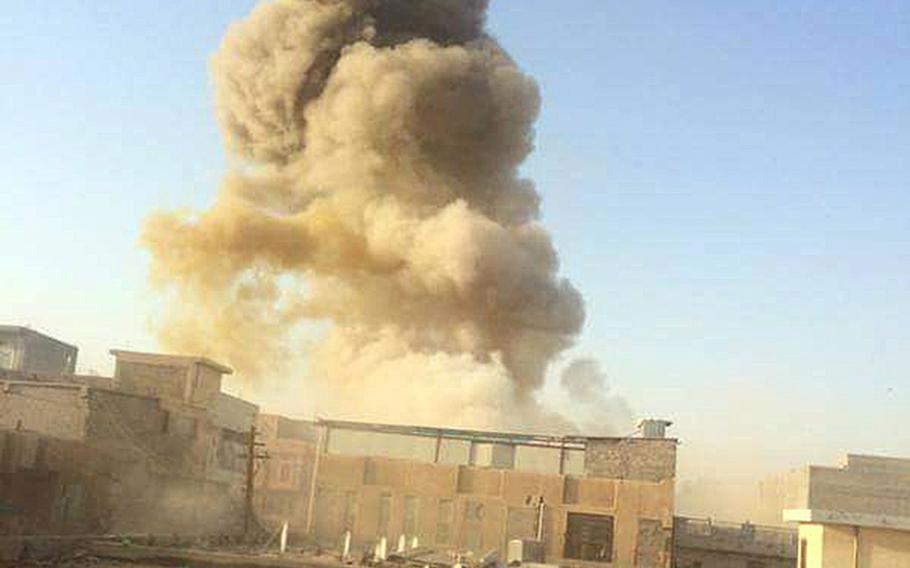
An Islamic State car bomb explodes at the gate of a government building near the provincial governor's compound in Ramadi, Iraq, on Saturday, May 16, 2015, during heavy fighting that saw most of the city fall to the militants. (Stringer, McClatchy DC/TNS)
WASHINGTON — The Pentagon acknowledged Monday that the Islamic State gained the upper hand in Ramadi and was “obviously not on the defensive” there, despite a claim last week by the U.S. general that the group was on its heels in Iraq.
Pentagon spokesman Col. Steve Warren said Iraq and coalition forces will now focus on recapturing Ramadi, but there were no plans to rethink the U.S. strategy in the wake of the biggest defeat since the fall of Mosul last summer.
Over the weekend, U.S.-backed Iraqi security forces fled Ramadi, capital of Anbar province about 70 miles west of Baghdad, following a lightning assault by the Islamic State and despite numerous air strikes.
Local officials estimated that 500 people, both civilians and military, have been massacred since Ramadi fell, and the Reuters news agency quoted U.N. officials as saying almost 25,000 people have fled the city toward Baghdad.
The loss of Ramadi, the biggest city in Anbar, was a stunning defeat for Iraq’s security forces. Online videos showed Humvees, trucks and other equipment speeding out of Ramadi with desperate soldiers gripping onto their sides.
“ISIL is obviously not on the defensive in Ramadi. That is fairly clear,” Warren said, using an alternate name for the group. “This is a difficult complex bloody fight and there is going to be victories and there are going to be setbacks and this is a setback.”
He said the Pentagon aims to retake the city but would not provide any details of its plans.
Gen. Martin Dempsey, chairman of the Joint Chiefs of Staff, on Monday called the fall of the city a “serious setback” for the Iraq security forces.
“Setbacks are regrettable but not uncommon in warfare,” Dempsey said in a statement. “Much effort will now be required to reclaim the city.”
Pro-government Shiite militias were flowing into areas near Ramadi on Monday to renew the fight against the Islamic State, despite concern that their use will only worsen the hostility between Shiites and Sunnis that is at the root of the Iraq conflict. Most of the population in Ramadi and Anbar are Sunnis.
Faced with few options, however, Warren said the Pentagon has raised no objection to Iraq’s decision to rely on the militias to confront the Islamic State in Ramadi.
“As long as the militias are controlled by the central Iraqi government there is a place for them,” he said.
Meanwhile, Warren said the Pentagon continues to believe its strategy of training Iraqi troops and then backing them in battle with the air strikes is working despite growing skepticism.
Last week, as Islamic State fighters were entering Ramadi, U.S. officials insisted that the militants had not overrun all of the city, dismissing their advance as “temporary gains in the east and south of the city.”
“We firmly believe Daesh is on the defensive throughout Iraq,” Marine Corps Brig. Gen. Thomas Weidley, the deputy commander of Operation Inherent Resolve, told Pentagon reporters Friday, referring to the militants by an Arabic term.
Iraqi forces and allied militias have regained some of the territory seized by the Islamic State over the past year, but the fresh defeat in Anbar has called into question the Obama administration’s hopes of relying solely on air power to support Iraqi forces in the battle against the extremists.
The militants are now thought to control of more than 60 percent of Anbar, which stretches from the western edge of Baghdad all the way to Syria and Jordan. The mostly desert province was the heartland of the Sunni insurgency against U.S. troops following the 2003 U.S.-led invasion that toppled Saddam Hussein.
Until now, the defense of Anbar had been in the hands of the military and Sunni tribesmen, whom the Shiite-led government has vowed to arm and support — but has only done slowly and partially.
Sen. John McCain, R-Ariz., said Sunday that the fall of Ramadi is “terribly significant” and that a larger U.S. presence may be needed to defeat the Islamic State.
The military has pointed to a victory over the group in the town of al-Baghdadi near Anbar’s al-Assad air base as proof that the training can be effective. The offensive included some units with U.S.-trained personnel.
Warren said he did not know the number of U.S.-trained Iraqi troops who fought in Ramadi.
So far, about 7,000 Iraqis have underwent training by American forces and another 3,000-4,000 are in the pipeline.
The U.S. has run almost daily air strikes on targets across Iraq to support the central government and has broken the Islamic State hold on the Syrian town of Kobani as well as the Iraqi cities of Sinjar and Tikrit.
But the strikes have also failed to dislodge the group from the oil refinery town of Beiji, which remains locked in a siege.